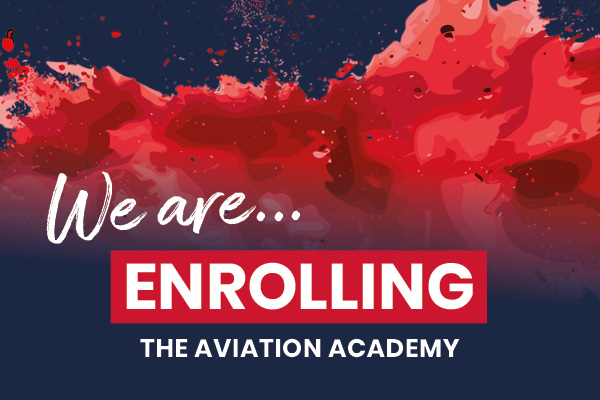Aviation Management & Operations with Pilot Studies FdSc
If you are looking to pursue a career in aviation; you are already employed in the industry, or you have a specific interest in studying independently for a Private Pilot’s Licence (PPL), this course will give you a valuable insight into key aspects of the mandatory knowledge required for a career as a pilot or in-ground operations management.
The FdSc Aviation Management & Operations (with Pilot Studies) has been developed to provide operational knowledge and understanding for those wishing to embark on a career as a pilot or in-ground operations management. For those who choose to study independently for their PPL alongside their FdSc, teaching staff are able to advise about companies that offer the PPL. However, to qualify as a PPL holder, a Class 2 medical certificate issued by a CAA Authorised Medical Examiner (AME) is also required.
You may benefit from our connections to local flying schools and our specific aviation skills-based academies and courses, which provide you with technical skills, knowledge and attitude enabling you to progress into the Aviation industry. Your studies are supported throughout by our partnership with Jet2.com and Jet2holidays and other key organisations including Leeds Bradford Airport.
Entry Requirements
- 64 UCAS tariff points
- English & Maths GCSEs grade 9-4 (A*-C) or equivalent
- Clear Disclosure Scotland or DBS check
- Students without the necessary qualifications but with relevant work experience are encouraged to apply for an interview
In addition, if you have a relevant HNC you may be able to transfer credit in certain modules onto the Foundation Degree.
What you will study
- Air Transport Development provides you with the knowledge required to understand how the industry developed and how it fits together to form a seamless air transport system. Assessed by a report and presentation (20 credits)
- Personal & Professional Development serves as an introduction to study at this level. This module will helps you to identify, practise and reflect on study techniques, academic research and written work and is assessed by a presentation and research project (20 credits)
- Customer Service Management in an Aviation Environment provides you with a fundamental understanding of the customer service environment of airlines and airports, its relative importance to the organisations concerned, the methods used to evaluate its impact and how it might be managed effectively. Assessed by a academic poster and written report (20 credits)
- Airline Operations allows you to understand the characteristics of different airline operational models and you will discover the rationale behind aircraft choices and why airlines operate to some destinations but not to others. Assessed by report and presentation (20 credits)
- Health, Safety & Security focuses on the need to acquire specialist health, safety and security knowledge specific to the aviation industry and is assessed by an audit report and presentation (20 credits)
- Airport Operations will make you aware of the complex nature of airport operations and how the myriad of different organisations involved work together to ensure a safe, secure and efficient system. Assessed by a written report & group presentation (20 credits)
- Human Resource Management will develop your practical knowledge and develop skills through case studies of human resource management in a range of different organisational settings within the aviation industry. Assessed by a presentation and case study (20 credits)
- Business Development & Marketing give you an understanding of the way in which air transport organisations develop their business. You will analyse operating environments, set objectives and goals, determine strategy and develop tactics for airlines and airports. Assessed by a written report and group presentation (20 credits)
- Decision Making in Air Transport Management provides an understanding of the key management issues and emerging threats facing airlines and airports, the practises used to manage them and the impact on users. Assessed by a written report (20 credits)
- Principles of Leadership & Management focuses on the theories that have shaped the understanding of leadership and management and how it supports and provides guidance to action for managers and leaders, to help secure their business and its success within the aviation industry. Assessed by a presentation and an academic poster (20 credits)
- Human Performance will give you an in-depth knowledge of the factors that affect performance capabilities of the human body, to enable you to predict the possible outcomes of degrading human performance due to the application of external influences. Assessed by a multiple choice exam and a case study report (20 credits)
- Navigation develops your theoretical knowledge of navigation following Visual Flight Rules (VFR). Using a variety of techniques, accurate navigation planning will be mastered. Assessed by a multiple choice exam and a flight plan rationale (20 credits)
You will receive feedback on your formal assessments within four working weeks of the submission date. Your overall grade for the course and your Foundation Degree classification is based on the marks obtained for the modules studied in year 2 of the course. More information can be found here: Student Information > Regulations
How you will study...
You will be taught through a combination of face to face lectures, guest speakers, visits and seminar sessions, which will be supported through group discussion and activities. Alongside course College attendance, you will be expected to undertake 10-12 hours of independent study each week, such as reading journal articles and books, undertaking research from academic and technical texts and preparing for assessments, presentations or examinations. Your independent study is supported by online resources managed by your module tutors, alongside the Learning Hubs at the Aviation Academy and Aireville Campus and the College’s Study Support Team. Average class sizes for HE courses are usually between 6 and 15 students.
A Foundation Degree is a nationally recognised qualification in its own right and is equal to the first two years of the full BSc (Hons) course. Once you have completed your Aviation Management & Operations (with Pilot Studies) FdSc you may progress onto a third and final year to complete the Air Transport Management BSc (Hons).
What's Next?
Further Study
- Air Transport Management BSc (Hons) Top-up (Craven College option)
Careers
- Pilot
- Aviation Engineer
- Aircraft Operator
- Air Traffic Control
- Airline Route Planner
- Air/Ground Transportation Manager



